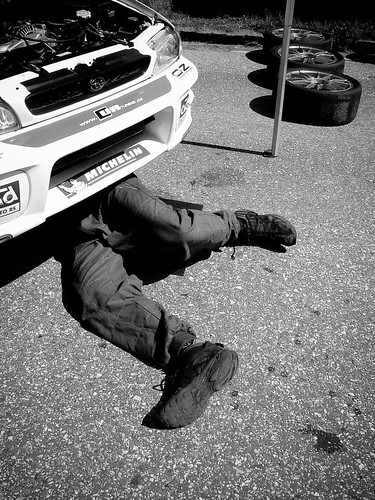Save on Gas with Auto Maintenance
I’m awful at maintaining my vehicles. Spectacularly bad. I have always relied on someone else to take care of oil changes, check tire pressure, and whatever else cars need to have done on a regular basis. When it rains, I congratulate myself for having washed the car.
I’m not into cars, obviously — never have been. Vehicles simply get me from point A to point B.
The problem is that the other people I rely on, like my dad and husband, also have their own cars and maintenance schedules to remember. And, as I found out last week, not maintaining my car will cost more not only in the long run, but also every time I fill up my gas tank. Don’t make fun — I really didn’t know this! The mechanic helpfully explained how fuel injectors affect gas mileage. I knew it was time to start taking better care of my car.
Thinking that perhaps others might not know these things, and with gas at more than $4 a gallon in some places, I thought we all could use a maintenance schedule to help us squeeze every last mile out of each gallon of gas and improve fuel economy.
The following schedule will help improve engine performance and increase the miles per gallon, so you can save money on gas:
Once a month: Check your tire pressure.
Under-inflated tires can cause accidents; increase wear (meaning you’ll be shelling out for new tires sooner than you should); and waste 5 million gallons of fuel per day, according to the U.S. The Department of Transportation.
Give your tires a visual once-over whenever you fuel up, and once a month use a digital tire gauge to make sure your tires have the pressure level required for your car. You can find pressure level on a sticker in the doorjamb on the driver side or in the owner’s manual. You can improve your fuel economy by up to 3.3% by keeping your tires at the proper pressure, according to the U.S. Department of Energy.
Every three to six months: Change the oil.
Changing the oil is important, but make sure you’re using the manufacturer’s recommended grade of motor oil, which will improve fuel efficiency, according to the U.S. Department of Energy and Environmental Protection Agency.
Although the accepted rule of thumb has been to change oil every 3,000 miles, Edmunds says that’s an outdated rule that wastes oil and money. The average car has an oil change interval of around 7,800 miles, but check your owner’s manual to make sure you aren’t going too long between changes, needlessly having them done too often.
Every four months: Rotate the tires.
Neglecting to rotate your tires leads to increased road noise, lower fuel economy, and decreased traction. You’ll also be shelling out cash to replace your tires sooner. The general recommendation is to rotate your tires every four months or 5,000 miles, but some cars can go longer in between rotations.
Every year: Replace the air filter and get a tune-up.
According to The Department of Energy, cars manufactured before the 1980s (those with carbureted engines) will see anywhere from a 2% to 14% improvement in MPG by replacing the air filter, depending on the current condition of the filter. Replacing a clogged air filter on modern cars (those with fuel-injected, computer-controlled gasoline engines), however, improves performance, but not fuel economy, according to a new study.
According to the U.S. Department of Energy, a tune-up can improve a vehicle’s gas mileage by an average of 4%, depending on the type of repair needed and how well it is done. A tune-up will include a comprehensive check of the car’s systems and fluid levels. Specific to fuel efficiency are replacing or cleaning the spark plugs and wires; replacing the distributor cap, fuel filter, PCV valve, and oxygen sensor; and cleaning the fuel injectors, if needed.
These services can yield significant savings in terms of MPG. The Department of Energy reports that fixing a faulty oxygen sensor, for example, can improve mileage by as much as 40%. Clogged or restricted fuel filters will reduce engine performance and allow dirt into the system, which wears on the engine. (Some manufacturers recommend replacing fuel filters every 2 years or 24,000 miles, others every 3 years or 36,000 miles.)
Finally, remember that these are just general guidelines. Before setting a maintenance schedule, refer to your car’s service manual. Some mechanics might push more frequent tune-ups or oil changes, but it’s best to stick to the factory recommendations to make sure you’re getting the maximum MPG and not overpaying for unnecessary services. Just because the sticker on your windshield says to get an oil change every 3,000 miles doesn’t mean that’s right for your vehicle!
Become A Money Boss And Join 15,000 Others
Subscribe to the GRS Insider (FREE) and we’ll give you a copy of the Money Boss Manifesto (also FREE)


